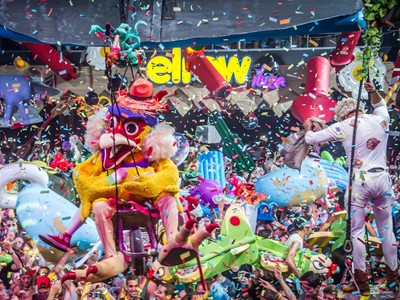Managing Editor
Calling your festival 'Oasis' and staging it in a luxury spa-hotel-desert hotspot is an audacious move
Its organisers - having realised that festival season doesn't have to include soggy tent-pitching - are right to be confident. Oasis proposed a line up of true talent, a choicely picked selection of international men and women who, placed in front of a mountain backdrop, made for an event worthy of the pilgrimage.
Nevertheless, we arrived skeptical. Reviews from Oasis’s inaugural year had been unnervingly positive, and we pictured an Ibiza crowd, glamorous and sun seeking. Paired with a shaky knowledge of Marrakesh’s drinking laws, we worried we might be dancing in an atmosphere as dry as its desert surroundings.
We soon learned to be unsurprised by surprises. By stepping into the grounds of the festival, we entered a walled theme park. There was detail in every turn, elegance that felt totally at ease with itself. Stages, souks, secret wind down spots, all connected by sandy pathways where you’d bump into familiar faces again and again.

Music was split into two: first there was the Desert Oasis, a pool-fronted main stage where big boys Dixon and Derrick May would preside and then The Arena, a pit like amphitheatre of constant energy provided by the likes of David August and The Black Madonna.
The importance of the sundown set was learned early on as The Hydra’s Dolan Bergin and Midland played on the first night. Both provided what a Moroccan friend would later explain as the perfect blend for the occasion: “We’re Mediterranean people. We like melodies, vocals. Give us uplifting music”.
Nigerian boogie followed by the faintest strains of disco found their place in these early hours, before night drew in and they were replaced with sounds visual enough to illuminate a steadily darkening sky. The first night undoubtedly belonged to Dixon, his four hour set becoming a journey into his capabilities that saw an atmosphere of early serenity take a distinctly wilder turn.

Eyes were lit from front to back as a light show fit for any high scale club bounced off the swimming pool, which had become a dance floor in its own right. He takes his time, easing into each chapter which starts with dub and ends with something that may or may not have resembled the Pet Shop Boys.
We wake the next day to lick our wounds in the sun. The festival is within driving distance of Marrakesh, completing the city-pool-festival package that makes Oasis so attractive. The bustle of the souk is a little overwhelming for bodies broken from the previous night’s sins, though by nightfall we’re as eager as ever to board the party bus. We’re reminded of our place with the windows down; a traditional Moroccan wedding party screeches past us, a Berber flute beckoning us to the dance.
Saturday held the heavy hitters; a relentless line up of acts who’d headline festivals in their own right. The day to night handover was seen to by BBC Radio 1’s B.Traits, one of many who had chosen to give her weekend to the festival as a punter. Having watched Midland the night before, she told us later about the conscious effort she took to bring her music into the darkness, and how honoured she’d been to see so many locals.
The Black Madonna was the postcard of the festival for myself and many others. Expectations rode high and were happily met in the heavens as Marea Stamper conducted the dance like a person capable of being both amongst the crowd and in the DJ booth at the same time. She sized us up and fed us what she knew we wanted; the audience lapped it up, greedily, shouting for more once she’d finished.

A welcome taste of home came from George Fitzgerald going back to back with Leon Vynehall. The familiarity of their names came close to making us stay by the indomitable Maya Jane Coles, but sinking back down into The Arena we were reminded of our clubbing roots. Here were two DJ's who'd help raise us as music lovers, their mixes and EPs crucial parts of our learning, playing for a crowd of so many nationalities in paradise. A true highlight, and a vague instiller of national pride.
Sunday of Oasis felt like a day of consolidation, full of last minute dashes to complete every last bucket list task. It opens with one of the sterling live acts of the festival: Omar Souleyman, the Syrian wedding singer championed by Four Tet and Gilles Peterson. His set feels as celebratory as the weddings where he cut his teeth and all present know they’re witnessing something extraordinary. Behind the glasses and the keffiyeh may be a man whose life is far from intact, but for an hour on Sunday night he is king.

Queen for the night (and shout out to Oasis for providing more than most) is the powerhouse of Helena Hauff. Mixing vinyl with cig in mouth, the vibe is akin to watching your fucking cool mate take the decks at a house party. She's on the main stage, taking on a cancelled Blawan's set (time that was later refunded to us), though the intimacy of the smaller stage remains and it's a perfect play out for those who've got early flights to catch.
In the shuttle on the way home I debrief, seeing the weekend reflected in the faces of the people we’ve danced and shared with. The glow of a secret well-kept hasn’t left our eyes and what lasts is the feeling of experiencing one of the most thought provoking festivals imaginable. Oasis by name and by nature, it's put Morocco on the map in an over saturated festival market, and we doubt that it's going anywhere but up.







